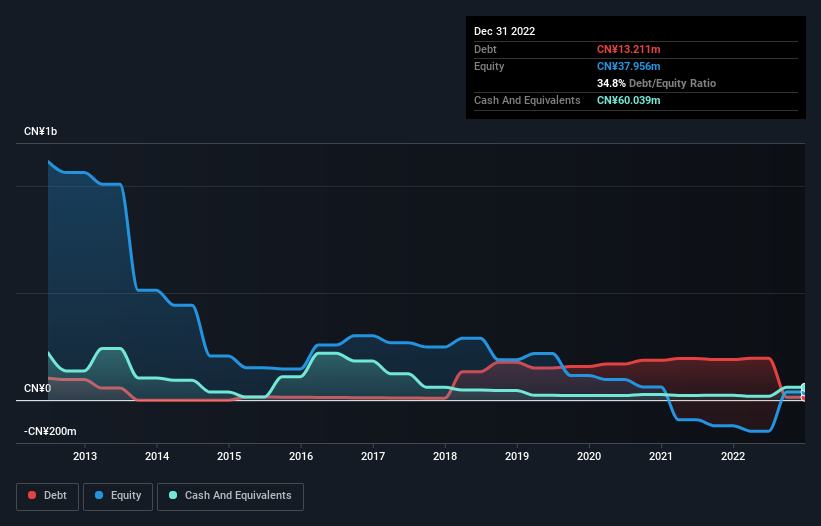
The external fund manager backed by Berkshire Hathaway's Charlie Munger, Li Lu, makes no bones about it when he says 'The biggest investment risk is not the volatility of prices, but whether you will suffer a permanent loss of capital.' So it might be obvious that you need to consider debt, when you think about how risky any given stock is, because too much debt can sink a company. We note that ShiFang Holding Limited (HKG:1831) does have debt on its balance sheet. But the real question is whether this debt is making the company risky.
When Is Debt Dangerous?
Generally speaking, debt only becomes a real problem when a company can't easily pay it off, either by raising capital or with its own cash flow. If things get really bad, the lenders can take control of the business. While that is not too common, we often do see indebted companies permanently diluting shareholders because lenders force them to raise capital at a distressed price. Of course, plenty of companies use debt to fund growth, without any negative consequences. When we think about a company's use of debt, we first look at cash and debt together.
See our latest analysis for ShiFang Holding
How Much Debt Does ShiFang Holding Carry?
The image below, which you can click on for greater detail, shows that ShiFang Holding had debt of CN¥13.2m at the end of December 2022, a reduction from CN¥189.2m over a year. But on the other hand it also has CN¥60.0m in cash, leading to a CN¥46.8m net cash position.

A Look At ShiFang Holding's Liabilities
The latest balance sheet data shows that ShiFang Holding had liabilities of CN¥203.3m due within a year, and liabilities of CN¥16.0m falling due after that. Offsetting this, it had CN¥60.0m in cash and CN¥14.8m in receivables that were due within 12 months. So it has liabilities totalling CN¥144.5m more than its cash and near-term receivables, combined.
This deficit is considerable relative to its market capitalization of CN¥184.2m, so it does suggest shareholders should keep an eye on ShiFang Holding's use of debt. This suggests shareholders would be heavily diluted if the company needed to shore up its balance sheet in a hurry. While it does have liabilities worth noting, ShiFang Holding also has more cash than debt, so we're pretty confident it can manage its debt safely. There's no doubt that we learn most about debt from the balance sheet. But it is ShiFang Holding's earnings that will influence how the balance sheet holds up in the future. So if you're keen to discover more about its earnings, it might be worth checking out this graph of its long term earnings trend.
Over 12 months, ShiFang Holding made a loss at the EBIT level, and saw its revenue drop to CN¥129m, which is a fall of 51%. That makes us nervous, to say the least.
So How Risky Is ShiFang Holding?
We have no doubt that loss making companies are, in general, riskier than profitable ones. And we do note that ShiFang Holding had an earnings before interest and tax (EBIT) loss, over the last year. Indeed, in that time it burnt through CN¥13m of cash and made a loss of CN¥170m. Given it only has net cash of CN¥46.8m, the company may need to raise more capital if it doesn't reach break-even soon. Summing up, we're a little skeptical of this one, as it seems fairly risky in the absence of free cashflow. When analysing debt levels, the balance sheet is the obvious place to start. However, not all investment risk resides within the balance sheet - far from it. We've identified 4 warning signs with ShiFang Holding (at least 2 which are a bit concerning) , and understanding them should be part of your investment process.
If you're interested in investing in businesses that can grow profits without the burden of debt, then check out this free list of growing businesses that have net cash on the balance sheet.
New: Manage All Your Stock Portfolios in One Place
We've created the ultimate portfolio companion for stock investors, and it's free.
• Connect an unlimited number of Portfolios and see your total in one currency
• Be alerted to new Warning Signs or Risks via email or mobile
• Track the Fair Value of your stocks
Have feedback on this article? Concerned about the content? Get in touch with us directly. Alternatively, email editorial-team (at) simplywallst.com.
This article by Simply Wall St is general in nature. We provide commentary based on historical data and analyst forecasts only using an unbiased methodology and our articles are not intended to be financial advice. It does not constitute a recommendation to buy or sell any stock, and does not take account of your objectives, or your financial situation. We aim to bring you long-term focused analysis driven by fundamental data. Note that our analysis may not factor in the latest price-sensitive company announcements or qualitative material. Simply Wall St has no position in any stocks mentioned.
About SEHK:1831
ShiFang Holding
An investment holding company, operates in the publishing and advertising businesses in the People’s Republic of China.
Mediocre balance sheet low.
Market Insights
Community Narratives



